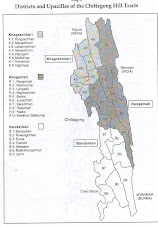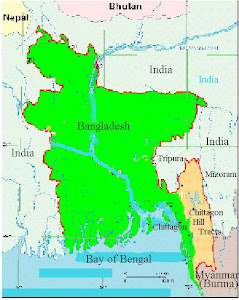
Recently, our reporter visited Kapru Para in Bandarban to investigate the impact of outside interaction on the life of Murung nationality, the second largest ethnic group in Bandarban district of Chittagong Hill Tracts. We are releasing the findings in a series of photographic expositions. Please find attached the fourth of the six-picture series.
Photo 4 of 6: Climbing up and down hills a part of everyday life
Life is quite hard in the mountainous region of Chimbuk. The Murung people have to trek long distances to reach a market place. If their village and their traditional jum land are taken away, they would have no other place to go. The only option open for them is to cross over to Mayanmar.
The government is tight-lipped about the possible land acquisition in Chimbuk. Our correspondent inquired with the government Land Office in Bandarban. But unfortunately the office was not forthcoming. One Jumma office clerk informed: "as far as I know the process has already begun to acquire land in Chimbuk." But he refused to show the documents or divulge details. The village elders in Kapru Para said that in 2005, the commander of Ruma garrison held a meeting with Headmen, Karbaris (village chief) and village elders and made known the plan to acquire lands in four Mouzas, namely Sepru Mouza (500 acres), Galenga Mouza (900 acres), Lemupalong Mouza (500 acres) and Lulain Mouza (500 acres). He urged them to accept compensation and leave the area.
But the Murungs refused to accept such blatant disregard of their life and livelihood lying down any further. On 14 December 2005, they submitted a memorandum to the Deputy Commissioner of Bandarban to scrape the plan. Mr. Ranglai Murung, Headman of Raingkong Mouza and chairman of Sualok Union, played a leading role in organising opposition to the said land acquisition plan. This is because of this that the joint forces arrested him on 23 February 2007, immediately after the imposition of state of emergency in Bangladesh.
On the other hand, the army put an embargo on Jum cultivation in these areas in 2005. Since then, Murungs have not been able to cultivate jum in the designated areas. This year many Murung families tried to prepare their land for jum farming, but the soldiers prevented them. The government did not arrange any alternative to jum cultivation for them. Deprived of the right to jum farming, many Murung families now find it hard to make both ends meet. Many go starving. Their economic life has begun to shutter.
Photo 4 of 6: Climbing up and down hills a part of everyday life
Life is quite hard in the mountainous region of Chimbuk. The Murung people have to trek long distances to reach a market place. If their village and their traditional jum land are taken away, they would have no other place to go. The only option open for them is to cross over to Mayanmar.
The government is tight-lipped about the possible land acquisition in Chimbuk. Our correspondent inquired with the government Land Office in Bandarban. But unfortunately the office was not forthcoming. One Jumma office clerk informed: "as far as I know the process has already begun to acquire land in Chimbuk." But he refused to show the documents or divulge details. The village elders in Kapru Para said that in 2005, the commander of Ruma garrison held a meeting with Headmen, Karbaris (village chief) and village elders and made known the plan to acquire lands in four Mouzas, namely Sepru Mouza (500 acres), Galenga Mouza (900 acres), Lemupalong Mouza (500 acres) and Lulain Mouza (500 acres). He urged them to accept compensation and leave the area.
But the Murungs refused to accept such blatant disregard of their life and livelihood lying down any further. On 14 December 2005, they submitted a memorandum to the Deputy Commissioner of Bandarban to scrape the plan. Mr. Ranglai Murung, Headman of Raingkong Mouza and chairman of Sualok Union, played a leading role in organising opposition to the said land acquisition plan. This is because of this that the joint forces arrested him on 23 February 2007, immediately after the imposition of state of emergency in Bangladesh.
On the other hand, the army put an embargo on Jum cultivation in these areas in 2005. Since then, Murungs have not been able to cultivate jum in the designated areas. This year many Murung families tried to prepare their land for jum farming, but the soldiers prevented them. The government did not arrange any alternative to jum cultivation for them. Deprived of the right to jum farming, many Murung families now find it hard to make both ends meet. Many go starving. Their economic life has begun to shutter.





